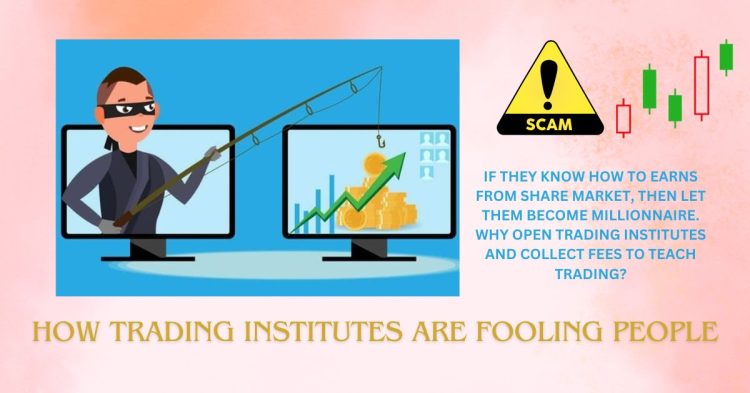Introduction
Trading institutes often present themselves as gateways to financial success, promising to teach individuals the secrets of the market and how to profit consistently. However, many of these institutions engage in deceptive practices that ultimately lead to disappointment and financial loss for unsuspecting individuals.
Common Tactics Used by Trading Institutes
Promises of Quick and Easy Profits
Trading institutes frequently lure people in with the promise of quick and effortless profits. They highlight success stories of individuals who have supposedly made significant gains after attending their programs. However, these success stories are often exaggerated or fabricated, leading individuals to believe that they can achieve similar results without adequate knowledge or experience.
Manipulative Marketing Techniques
Another common tactic employed by trading institutes is the use of manipulative marketing techniques. They utilize high-pressure sales tactics and persuasive language to convince individuals to sign up for their courses or programs. They often create a sense of urgency, making individuals feel like they are missing out on a lucrative opportunity if they don’t act immediately.
Hidden Costs and Fees
Many trading institutes fail to disclose the full extent of their costs and fees upfront. While they may advertise their courses as being affordable or even free, there are often hidden costs associated with materials, software, or additional training sessions. These hidden fees can quickly add up, leaving individuals with unexpected expenses and feeling misled.
Lack of Regulatory Oversight
Exploiting Regulatory Loopholes
One of the reasons trading institutes are able to get away with deceptive practices is due to the lack of regulatory oversight in the industry. Unlike other financial institutions, trading institutes are not subject to strict regulations or oversight by government agencies. This lack of regulation allows them to operate with impunity, preying on unsuspecting individuals without fear of repercussion.
Minimal Accountability
Furthermore, trading institutes often lack accountability for the results of their programs. Even if individuals do not see the promised returns on their investments, there is often little recourse available to them. Trading institutes may offer disclaimers or fine print that absolve them of any responsibility for losses incurred by their students.
The Reality of Trading Education
Importance of Thorough Research
In reality, successful trading requires more than just attending a few classes or seminars. It requires a comprehensive understanding of market dynamics, risk management strategies, and technical analysis. Individuals who are serious about becoming successful traders should conduct thorough research and seek out reputable sources of education.
Recognizing Legitimate Education vs. Scams
It’s essential for individuals to be able to distinguish between legitimate trading education and scams. Legitimate institutions will have transparent pricing, reputable instructors, and a track record of success. On the other hand, scams often make unrealistic promises, use aggressive marketing tactics, and lack credibility.
Conclusion
While trading institutes may promise the keys to financial success, many of them engage in deceptive practices that ultimately harm individuals. By understanding the common tactics used by trading institutes and conducting thorough research, individuals can avoid falling victim to these scams and pursue legitimate avenues for trading education.
FAQs
- Are all trading institutes scams?
- Not all trading institutes are scams, but it’s essential to research thoroughly before enrolling in any program. Look for transparent pricing, reputable instructors, and positive reviews from past students.
- Can I get rich quick by attending a trading institute?
- While trading can be profitable, it’s unlikely that attending a trading institute alone will make you rich quick. Success in trading requires education, experience, and disciplined risk management.
- What should I look for in a reputable trading institute?
- Look for institutions with transparent pricing, experienced instructors, and a track record of success. Avoid institutes that make unrealistic promises or use aggressive marketing tactics.
- Are there any regulatory bodies that oversee trading institutes?
- Unfortunately, trading institutes are not subject to strict regulatory oversight like other financial institutions. It’s essential to be cautious and conduct thorough research before enrolling in any program.
- What steps can I take to protect myself from trading scams?
- Always research thoroughly before enrolling in any trading program. Be skeptical of promises of quick and easy profits, and look for transparent pricing and reputable instructors.

